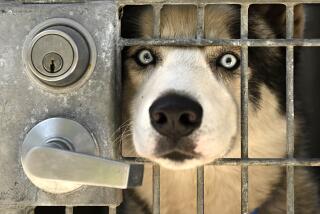Why would disabled tenant need a parakeet?
- Share via
Question: I have been the property supervisor at a large apartment community for several years. I thought I was well-versed in my reasonable-accommodation responsibilities, but recently I received a request from a resident that surprised me. She has asked me to waive our no-pet policy so she can have a pet parakeet to live with her in her unit. I understand that disabled people depend on guide dogs and that even cats and other animals can help disabled people by being their eyes and ears. I don’t understand how a parakeet can help someone who is disabled. Do I have to grant this request?
Answer: As you already know, a reasonable accommodation request can be based on a waiver of a no-pet rule to permit the use of a service animal such as a guide dog. But if necessary to improve the daily living functions of a disabled person, a reasonable accommodation request can involve a companion animal.
Companion animals aid a disabled person — for example, a person with serious depression — by acting as the focus of the person’s care and attention, thereby improving the disabled person’s daily functioning. The person requesting a companion animal must have a genuine disability that affects a major life function.
The reasonable accommodation request must have the written support of a person with medical credentials certifying that the companion animal is necessary to alleviate the disability. For further clarification, contact your local fair housing agency.
Eichner is director of Housing Counseling Programs for Project Sentinel, a mediation service based in Sunnyvale, Calif. To submit a question, go to https://www.housing.org.


